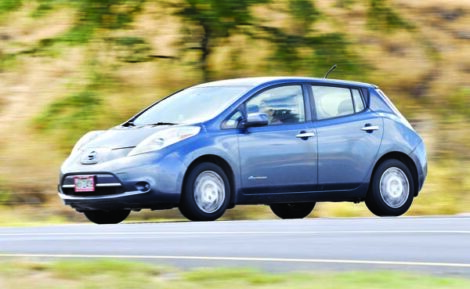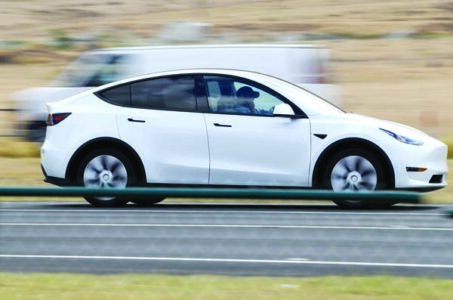EV chargers coming to Maui under federal program
Hawaii first in nation to kick off installation through infrastructure bill-funded program
The Puunene Park and Ride is poised to be one of the first in the state to receive electric vehicle chargers through the multibillion-dollar National Electric Vehicle Infrastructure program, which is part of the Infrastructure Investment and Jobs Act.
Federal, state and private industry leaders announced Tuesday that Hawaii is the first in the nation to secure the charger order though the NEVI program funding. They described Hawaii as “the ideal state to take the lead” due to the impacts of climate change on the islands and the state’s reliance on imported fuel.
It is estimated that Hawaii will receive a total of $17.6 million in funding throughout the duration of the program, according to a news release from Tritium DCFC Ltd., which is providing the chargers for the state in this first round of program funding.
“The first set of EV chargers that are funded by this work is basically going to hit the ground in Hawaii, so Hawaii, congratulations for doing that,” Mitch Landrieu, the White House senior adviser and infrastructure coordinator, said Tuesday.
Landrieu was part of a webinar Tuesday with other government and industry leaders, including Gabe Klein, executive director of the U.S. Joint Office of Energy and Transportation, and Ed Sniffen, director of the Hawaii Department of Transportation.
“Electrification is amazingly important for the nation, and especially so for Hawaii — we are the most reliant state on foreign fuel of anybody else and we want to make sure we break ourselves of that, and electrification is the way to go,” Sniffen said. “We also want to make sure we are more energy secure, and electrification is absolutely the direction we need to go to ensure we can start capitalizing on our own green energy productions that we have in Hawaii.”
“So we really appreciate the leveraging that the bill from the Biden administration had given us and the focus that it has given us to make sure that we push forward on the needs for Hawaii,” Sniffen said.
He added that chargers will be placed across the state, including on Molokai and Lanai, down the line. Both islands will need Level 2 charging stations because their limited grids cannot support 600-kilowatt fast-charging stations, according to Hawaii’s NEVI plan.
According to the U.S. Department of Energy, the NEVI program provides funding to the states to strategically deploy electric vehicle charging stations and to establish an interconnected network to facilitate data collection, access and reliability. Funding is available for up to 80 percent of eligible project costs.
The program will provide $5 billion over five years to support the development of EV charging infrastructure across the nation’s highways, according to Tritium.
Hawaii’s 32 chargers were procured for the state DOT by Sustainability Partners from Aloha Charge, a sister company to National Car Charging, which provides EV charging installations.
The announcement comes days after Gov. Josh Green signed into law a bill that will create a mile-based road usage charge to replace state motor fuel taxes for electric vehicles beginning on July 1, 2025. It will also eliminate the $50 annual state vehicle registration surcharge for electric vehicles.
The measure allows electric vehicle owners to pay a registration surcharge or a per-mile road usage fee until June 30, 2028.
And, in the long term, it will require the state Department of Transportation to create a plan for the deployment of a state mileage-based road user charge program for all passenger vehicles and light-duty trucks by 2033.
As electric and hybrid vehicles replace fuel-powered vehicles, Hawaii and most other states are seeing a flattening of fuel tax revenues, according to Mindy Kimura, project manager for the road usage charge project for the DOT.
Kimura shared information on the project during the Maui County Council’s Budget, Finance and Economic Development meeting on Tuesday. No decision-making was scheduled.
Hawaii is now one of four states in the nation to enact road usage charging, which is a per-mile fee that charges drivers for the miles they drive instead of the number of gallons of fuel they use, Kimura said.
Currently, lower-income and rural households generally pay more in gas taxes because they drive older, less fuel-efficient vehicles. But buying an electric vehicle is currently skewed toward higher-income households. With a road usage charge, it will be more equitable, Kimura added.
Sniffen said he expects chargers at least at one site on Oahu and one site on Maui to be completed by the end of this year. They are also working on sites on Hawaii island and Kauai. Maps will be posted of specific areas of the sites later on.
The DOT said in an email Tuesday that the Puunene Park and Ride along Kuihelani Highway near the intersection of Puunene Avenue and Kuihelani will be one of the first in the state to receive the chargers.
Another possible area for charging stations is in West Maui near the Lahiana Civic Center, according to the DOT.
Sniffen said he expects all stations to be completed in this round by the end of 2024.
In all, there will be eight Tritium NEVI systems, totaling 32 chargers and 16 power units, according to Tritium.
Sniffen said there will be a fee for using the chargers, but that still has to be worked out.
In September 2022, the Federal Highway Administration approved Hawaii’s Electric Vehicle Infrastructure Deployment Plan, granting the state access to $2.6 million of NEVI funding in fiscal year 2022.
As part of its NEVI deployment plan, the state DOT is utilizing its existing contract with Sustainability Partners, a public benefit company mandated to form reliable and enduring partnerships with public institutions for the advancement of their critical infrastructure, according to a news release.
“Hawaii is the ideal state to take the lead with the NEVI program because while the environmental stakes are high for all of us, Hawaii is seeing the effects of climate change front and center, each and every day,” Jim Burness, CEO of National Car Charging & Aloha Charge, said during the webinar. “The urgent need to get off of fossil fuels cannot be understated and these NEVI stations will allow the drivers in Hawaii to transition to electrified transportation even more quickly.”
* Staff Writer Melissa Tanji can be reached at mtanji@mauinews.com.
- An electric car zips along Honoapiilani Highway on Tuesday afternoon in Maalaea. The Maui News / MATTHEW THAYER photos
- A driver of an electric car turns from Honoapiilani Highway onto North Kihei Road Tuesday afternoon.







